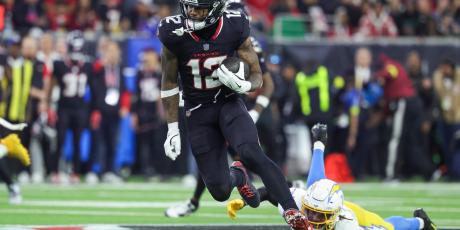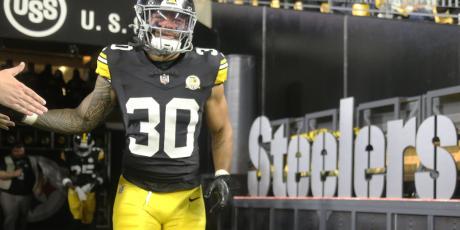Fantasy Football Impact: Dalvin Cook to the Jets

Dalvin Cook finally signed with a new team, inking a one-year deal with the New York Jets after weeks of speculation following his release from the Vikings, the only team he’s played for. It was curious timing, as second-year back Breece Hall was immediately removed from the PUP list following the signing, and rookie Israel Abanikanda flashed in preseason work. With a lot of names swirling around the Jets’ running back room, how should fantasy managers approach Cook heading into draft season?
Dalvin Cook in 2022
At age 28, Cook is coming off his fourth consecutive Pro Bowl selection after rushing for 1,173 yards and eight touchdowns in 17 games. He added 295 yards and a pair of scores on 39 receptions and 56 targets as well. Cook has at least 1,300 scrimmage yards in four straight seasons, despite missing at least seven games in that span. In half-PPR leagues, he was the RB10 last year in fantasy points, and his splits aren’t bad either. While he had a couple of rough games at the very end of the year, he was still posting solid numbers deep into the season and he gained 70 yards on 15 carries and six receptions in the Wild Card loss to the Giants. He looked like he still had the agility and pop that has made him one of the most productive running backs in football over the last four seasons.
Here are a bunch of Dalvin Cook touches from his wild card game last year. Judge for yourself. pic.twitter.com/BKCSEijBGJ
— Hayden Winks (@HaydenWinks) August 15, 2023
Cook’s departure from Minnesota was likely more of a financial move than one based on talent. They had a capable backup in Alexander Mattison, who they proceeded to re-sign and now they’re paying just $7 million dollars over the next two years to their starting running back. Per OverTheCap, that’s less than they’ll be paying Cook in dead money.
Make no mistake, Cook can still play. He may be on the back end of his career, but he’s still a productive back when he gets the touches.
Opportunity in New York
Where those touches are coming from is a different story altogether. The Jets used a second-round pick on Breece Hall a year ago, and Hall flashed elite potential in limited game action last season. In the three games where he logged double-digit carries, he averaged 5.1 yards per carry, and he scored a touchdown in five out of the seven games he played in before tearing his ACL in Week 7.
Behind Hall, you have a solid crew of runners with varying skill sets. Michael Carter has 1,654 yards from scrimmage over his first two seasons and averages 3.6 targets per game. Zonovan Knight took over as the starter for four games last season and had a couple of nice games, including 118 yards on 15 carries and five catches in a close loss to the Vikings in Week 13. Now you add rookie Israel Abanikanda, a one-cut-and-go downhill runner with tremendous power out of Pittsburgh. This looks like a mess!
However, when you squint, you can see the master plan. Hall is coming off an ACL injury. He’s the future in the New York backfield, but the team doesn’t want to rush him back. He’ll play, but as our own Adam Hutchison notes in his excellent Breece Hall profile:
“The year after an ACL tear is challenging. This applies to most positions but is especially true for RBs. Efficiency typically declines, which in turn negatively impacts fantasy production.”
However, Hutchison goes on to say “It's unlikely Hall plays a full season (most RBs don't) but 13-14 games seems very realistic.” This makes sense.
Meanwhile, Michael Carter seems like more of a complementary player than a full-time workhorse. Carter had 183 touches his rookie year and 155 touches last season, and those seem like about the most the team will want to give him. He was a part-time player in college as well, playing the lightning role to Javonte Williams’ thunder in the North Carolina backfield. Carter’s busiest collegiate season had him touch the ball 198 times as a junior.
Knight looks like excellent depth and Abanikanda may be a candidate for the practice squad. These are nice fallback options for the Jets, but they are unlikely to threaten Carter or Hall for any real game action, barring injury.
The Jets fancy themselves a contender. If they didn’t, they wouldn’t have traded draft capital for Aaron Rodgers. They need to go into the season with a strong plan for success around their star quarterback who will turn 40 in December. A one-year deal with Cook as insurance for Breece Hall was likely too tempting to pass up. I expect Cook to be a very prominent part of the offense for the first few weeks of the season while Hall ramps up from his injury. Expect his production to slip as Hall rounds back into form, however, and this could be a full-time committee for the later part of the season.
Cook will be productive. The Jets have some talent on the offensive line and Aaron Rodgers should keep opposing defenses honest, but expecting a lot from him deep into the season while in a timeshare is folly. He’ll be worth minimal investment early on, and then a low-end bench spot on your fantasy roster for the rest of the year.
Hall remains a very good—and possibly a buy-low—dynasty option, with some redraft potential for patient managers. Signing Cook makes a lot of football sense for the Jets, who can now give their prize sophomore back more time to get right.
Bottom Line
- Cook has some value in fantasy but is risky in the seventh round. If he slips to double-digits, he’s worth adding for early season production, but players going at similar ADP like Brian Robinson, James Cook, and Khalil Herbert, offer more upside for most managers.
- Cook hurts Hall’s fantasy value, whose third-round price tag now seems a bit high.
- Expect Cook to eat into the workloads of both Hall and Michael Carter, but Carter’s low cost makes him viable in deep PPR leagues or as a last-round pick in best ball formats.
- Overall, the Cook signing makes the Jets’ backfield a losing proposition when you factor in ADP. Stay away.

















